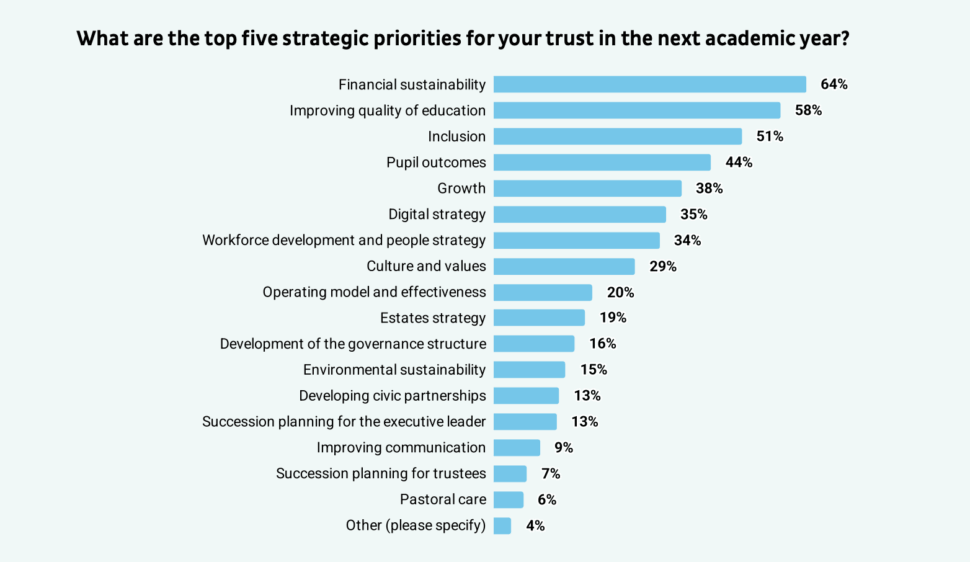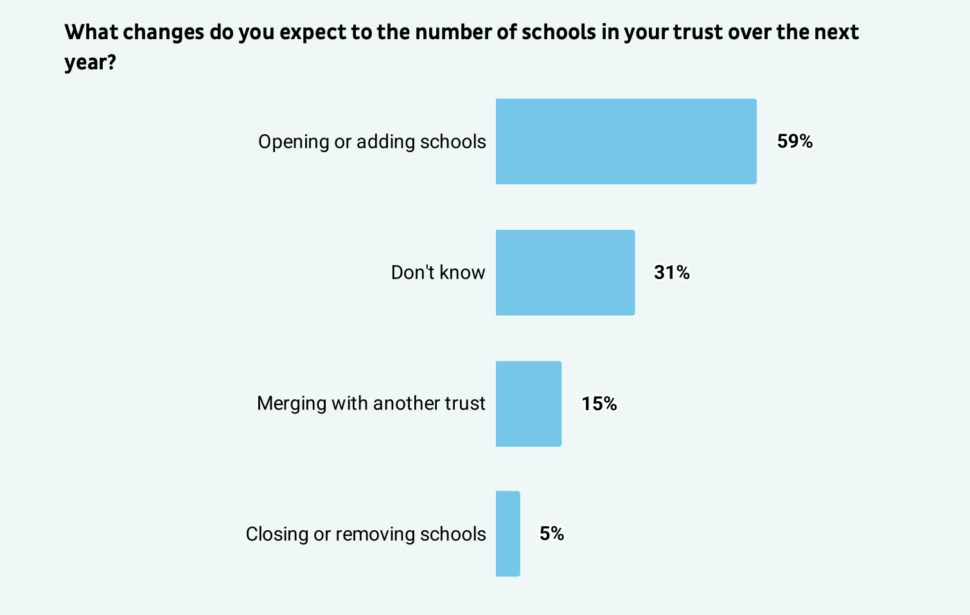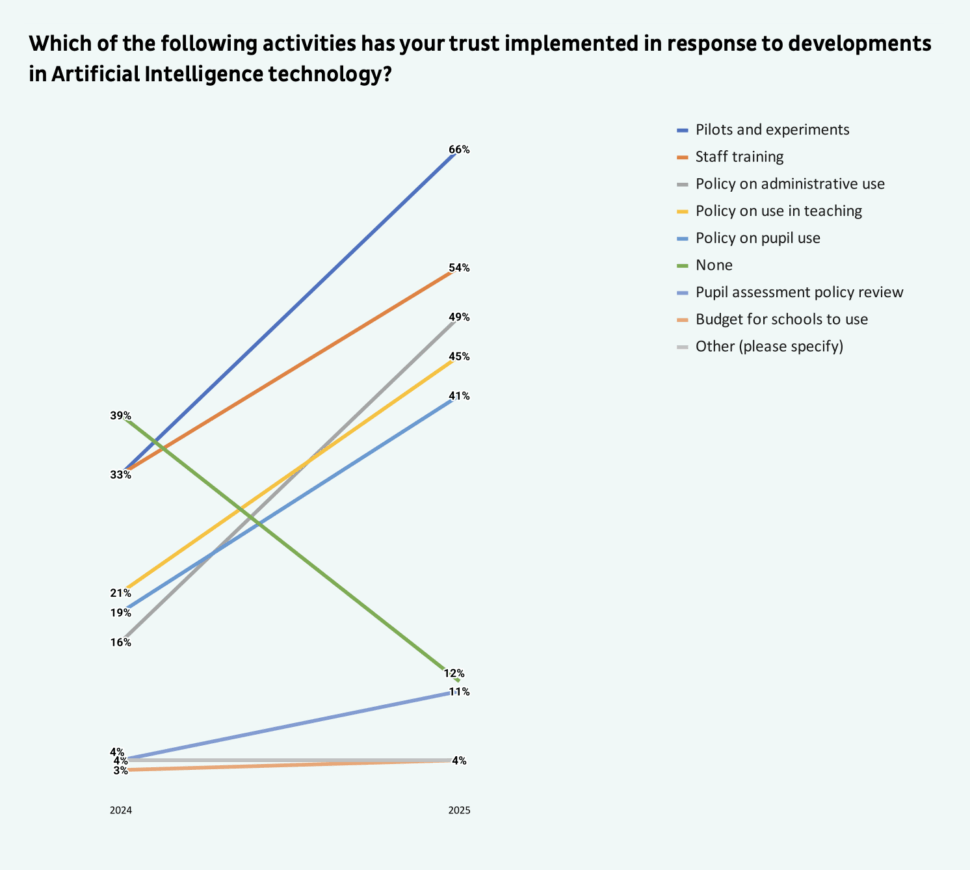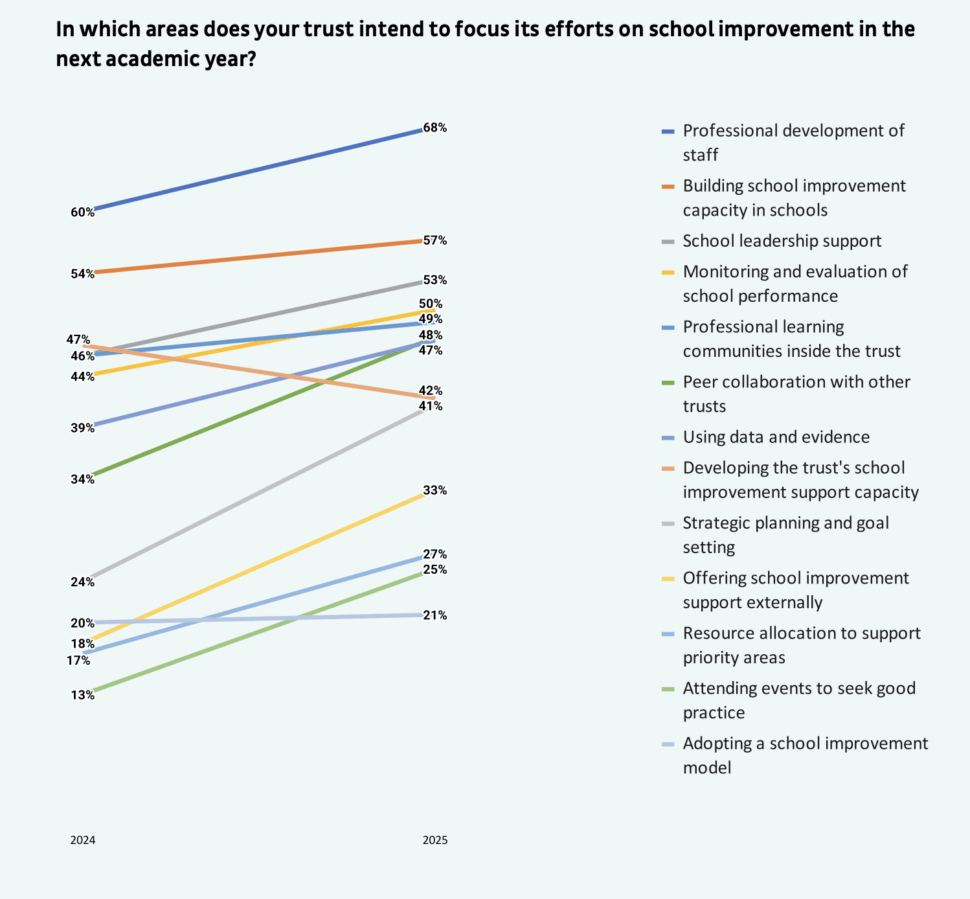Financial sustainability remains the top priority and greatest challenge among England’s academy trust leaders, with over half considering cuts to classroom staff to balance the books, a new survey has found.
The fourth annual Confederation of School Trusts (CST) surveyed 390 CEOs of trusts between two and more than 20 schools.
Other top priorities included improving quality of education, inclusion, pupil outcomes and growth, while more bosses reported concerns about falling rolls.
CST chief executive Leora Cruddas said: “Improving education on behalf of children is the mission that drives us forward, but that work depends on the same things as any large organisation: funding, people, and our ways of working.”
Here’s what we learned.
1. Job cuts loom amid sustainability worries…
Financial sustainability was CEOs’ number one priority this year – for the second year running. As well as being the most common priority, it was also seen as the most challenging for trusts, the survey by Edurio found.
More than four in five CEOs said budget challenges were the biggest barriers to delivering their priorities, way ahead of the second most common, SEND provision challenges (64 per cent).

Over half of trusts are considering cuts to classroom staff to balance the books, with 60 per cent looking at reducing teaching assistant hours, while a third are looking at school leadership changes.
However cutbacks at trust level were less likely. Just a fifth of surveyed CEOs were planning a reduction in trust support or leadership roles.
But bosses were sightly more positive about their trusts financial stability compared to last year, with only 1 per cent reporting to be ‘not confident at all’ compared to 4 per cent in 2023-24.
2. … and growth now a lower priority
The second most important priority was improving the quality of education, though the proportion citing it has fallen since last year.
Growth is also now less of a priority (falling from 52 per cent last year to 38 per cent), but developing a digital strategy is growing quickly.
3. Falling rolls headache grows
The number of CEOs reporting that falling rolls were a barrier to achieving their priorities has risen from 40 per cent last year to 45 per cent now.
More than half (53 per cent) of bosses see falling rolls as the most immediate risk to trust financial sustainability, followed by SEND costs (46 per cent) and teaching staff costs (37 per cent).

Recruitment and retention as a barrier has plunged from 54 per cent in 2023 to just 19 per cent this year.
While 60 per cent of CEOs said they expect their trust to open or add schools, 15 per cent expected to merge (one in seven), and five per cent envisaged closing or removing schools.
4. SEND provision remains a concern
Inclusion and SEND provision has remained a concern this year, as the second highest worry for bosses behind finances.
When asked about challenges in SEND provision, funding and resources emerged on top, cited by 86 per cent of CEOs. This was followed by coordinating support with external agencies and services (55 per cent), and staffing (35 per cent).
5. Attendance policies updated – but not impactful
Some 68 per cent of trust leaders said they had updated attendance policies, but when asked what had been the most impactful, only 3 per cent referenced policy changes.
Targeted interventions for at-risk pupils were reported most frequently by CEOs as the most impactful activity, at 31 per cent, followed by monitoring and tracking (23 per cent) and parental engagement incentives (21 per cent).
6. AI usage increasing
Twice as many trusts are reporting pilots and experiments with Artificial Intelligence compared to last year (33 per cent to 66 per cent).

There has also been a rise in trusts creating policies on the use of AI in administrative use, teaching, and its use by pupils.
There was a rise in the proportion of trust leaders wanting to focus efforts on technology, data and IT infrastructure over the next academic year, up from 53 per cent last year to 68 per cent this year.
CEOs at larger trusts were found to be almost four times as likely to be focusing on environmental sustainability compared with smaller trusts.
7. School and staff improvements
More trust leaders said they wanted to focus on staff development compared with last year, rising from 60 per cent to 68 per cent.

There were also reported rises in CEOs’ desire to build school improvement capacity in schools (54 per cent to 57 per cent) and build school leadership support (46 per cent to 53 per cent).








Trusts simply cannot be trusted as safe pairs of hands. We see even key staff (eg the last stem skilled teacher or SEND lead) who leave not being replaced whilst The Arts being deliberately cut back and the future prospect of subjects like D&T under serious threat ( check out Tony Ryan: D&T Teachers Association) . The result bigger classes and inordinate numbers of teachers and assistants leaving. It’s the natural consequence of the idea, telegraphed long ago by the importation from the USA of a business target driven model applied to education. Academies, Trusts and the propaganda or marketing that supports them that pitches education as a commodity spurred on by competition and league tables have put uk schools in the dire straits we see today. We have a situation where schools are under equipped and under funded where teachers bare the burnt of the load whilst being blamed for the failures. Not only that we tax anyone who wishes to go on to HE: the average student debt on graduation is in excess of £50k and rising. Only fools would de-educate or deskill the Uk workforce or so arrange matters that emigrating after graduation would be a serious and attractive option, particularly if stay meant being unable to afford anywhere to rent or buy.
Education is too important to be based on a business foundation and too important for schools to be run on a batch factory production model. Education is a collaborative process and we need to collectively fund it generously for the greater good.
Academy Trusts. Utterly useless. As my mother used to say, “more heads than a hydra”. And it seems that like a hydra, MATs will add more and more leadership positions whilst forgetting that the people who really have an impact on children are the teachers and TAs not the Director-of-stuff-and-nonsense who never goes in a classroom!